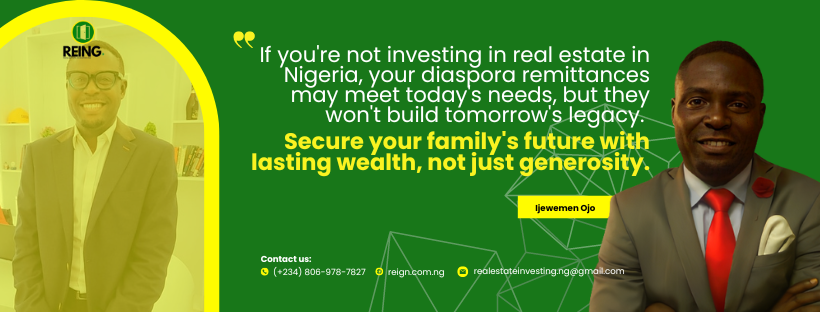Real Estate for Nigerians in the Diaspora: How to Buy Property and Invest from Abroad

For Nigerians living abroad, investing in real estate back home is more than just a financial decision—it’s a way to stay connected to Nigeria while building wealth. The Nigerian real estate market, especially in cities like Lagos, Abuja, and Port Harcourt, offers significant opportunities for high returns. However, investing from afar comes with unique challenges, and it’s essential to navigate these with trusted agents, thorough legal checks, and smart financial planning.
In this guide, we’ll explore everything you need to know as a Nigerian in the diaspora to invest successfully in real estate back home.
Why Should Nigerians in the Diaspora Invest in Real Estate?
Nigerians in the diaspora have long been the backbone of many families back home, sending remittances that provide essential financial support. Whether it’s for education, healthcare, or daily living expenses, the money you send plays a vital role in sustaining the welfare of your loved ones. In fact, remittances from the Nigerian diaspora contribute significantly to the country’s economy, amounting to billions of dollars each year. However, while this generosity is essential, it’s also important to think about how you can further secure the funds you work so hard to earn. Here are a few reasons you should start investing in real estate back home.
1. High Return on Investment (ROI)
The Nigerian property market is experiencing steady growth, particularly in urban centers like Lagos, Abuja, and emerging cities like Ibadan and Owerri. With real estate values rising, it’s one of the most lucrative ways to generate long-term wealth.
2. Secure a Financial Future
Owning property in Nigeria gives diaspora investors a sense of financial security. For many, it’s also a strategic retirement plan, offering a place to return to or a valuable asset to sell or rent out in the future.
3. Diversify Your Investment Portfolio
Real estate allows you to diversify your portfolio beyond stocks, bonds, or savings abroad. Nigerian property, especially in thriving areas, tends to appreciate over time, making it an attractive investment.
Beyond financial gains, investing in property keeps you tied to your roots. Whether you intend to return home eventually or maintain a base for visiting family, owning land or property ensures you have a stake in Nigeria’s future.
Challenges of Investing in Nigerian Real Estate From Abroad

1. Trust Issues
One of the most significant challenges diaspora investors face is dealing with trust. Without being physically present, there’s a risk of falling victim to fraudulent agents or sellers. Therefore, it’s critical to work with reputable, verified consultants, agents, and companies.
2. Legal Complexities
Navigating the Nigerian legal landscape when it comes to land ownership can be tricky. Ensuring the property has a valid title, like a Certificate of Occupancy (C of O) or Governor’s Consent, is key to avoiding land disputes.
3. Remote Property Management
Managing property from abroad is another challenge, especially if you plan to rent it out. Without a local property management company, handling tenants and maintenance remotely can be difficult.
Steps to Successfully Investing in Real Estate from the Diaspora
Steps to Successfully Investing in Real Estate from the Diaspora
1. Work with Reputable Real Estate Agents
Partnering with trustworthy real estate agents in Nigeria is critical. Look for agents with experience dealing with diaspora clients and who are registered with recognized bodies like the Nigerian Institution of Estate Surveyors and Valuers (NIESV). Ask for references and conduct background checks on the agency.
Tips for Choosing the Right Agent:
- Verify the agent’s credentials and check their past transaction history.
- Ask for testimonials from other Nigerians in the diaspora.
- Use agents who offer clear and transparent processes for title verification.
2. Utilize Virtual Property Tours
Thanks to technology, diaspora investors can now view properties remotely. Many real estate firms offer virtual tours and live video walkthroughs, allowing you to explore properties without traveling to Nigeria.
Best Practices for Remote Property Viewing:
- Always request a live video tour to see the current state of the property.
- If possible, send a trusted friend or family member to inspect the property in person.
3. Verify Property Titles Thoroughly
Before purchasing any property in Nigeria, ensure that the property has a legitimate title. The most secure land title is the Certificate of Occupancy (C of O), which legally confirms ownership.
Key Titles to Know:
- Certificate of Occupancy (C of O): This title grants legal ownership of land for up to 99 years.
- Governor’s Consent: Required for transferring property with an existing C of O.
- Deed of Assignment: This document transfers property rights from one party to another.
Always work with a qualified real estate lawyer to conduct due diligence on the title at the Lands Registry to verify its authenticity.Some Real Estate consultants can do that for you, too.
4. Explore Financing and Mortgage Options
If you don’t have full capital upfront, several Nigerian banks offer mortgages for diaspora clients. These options can help you secure property while spreading payments over time.
Popular Mortgage Providers for Nigerians Abroad:
- UBA Diaspora Mortgage
- First Bank Nigeria Diaspora Home Loans
- Zenith Bank Diaspora Mortgage
Make sure to compare interest rates and loan terms. Nigerian mortgages typically have shorter repayment periods and higher interest rates than those in Western countries.
5. Hire a Property Management Company
For diaspora investors interested in renting out properties, hiring a professional property management company is essential. They handle everything from tenant relations to maintenance, ensuring your investment is well-maintained.
Services Offered by Property Managers:
- Tenant Screening: Ensuring you get reliable tenants.
- Rent Collection: Managing payments and depositing funds into your account.
- Property Maintenance: Handling repairs, inspections, and general upkeep.
Popular Cities for Real Estate Investment in Nigeria

1. Lagos
Lagos, the economic hub of Nigeria, is one of the top cities for real estate investment. Areas like Lekki, Victoria Island, Ikoyi, and Ikeja are especially popular, offering a mix of luxury and affordable housing options.
2. Abuja
As Nigeria’s capital, Abuja offers high-end property options, especially in districts like Maitama and Asokoro. It’s an ideal place for diaspora investors looking for premium real estate.
3. Port Harcourt
Port Harcourt’s thriving oil and gas industry makes it a prime location for real estate investment. The city offers both luxury homes and more affordable properties in emerging areas.
4. Emerging Markets: Asaba, Ibadan, Owerri, Abeokuta
These cities offer more affordable land prices compared to Lagos and Abuja, with the potential for high appreciation as infrastructure develops.
Common Pitfalls to Avoid
- Fraudulent Transactions: Always ensure title verification and legal paperwork are in place.
- Overpricing: Use a licensed valuer to ensure you’re paying a fair price.
- Ignoring Legal Requirements: Always follow legal procedures for title registration to avoid disputes.

Frequently Asked Questions (FAQ)
Can Nigerians in the diaspora buy property in Nigeria?
Yes, Nigerians living abroad can buy property in Nigeria through trusted agents. It’s essential to verify the property’s title and follow all legal steps.
What documents are required to buy real estate in Nigeria?
You will need a Certificate of Occupancy (C of O), Deed of Assignment, and Governor’s Consent if the property has been previously owned.
What are the best cities for real estate investment in Nigeria?
Top cities include Lagos, Abuja, and Port Harcourt. Emerging markets like Ibadan, Owerri, and Abeokuta are also great for early investment.

Author
Ijewemen Ojo is the Principal Consultant at BlueMouse Media, and the founder of REING, a Real Estate Investment information hub for smart investors seeking to use real estate as an investment instrument for creating sustainable, trans-generational wealth. He is a certified Realtor.




